The latest German offensive in the north of Stalingrad soon followed the same pattern as all the others, a dogged German advance met by equally dogged resistance: the Germans slowly inched through the ruins towards the River Volga and the Soviets grimly clung on, and the battle became a brutal war of attrition. Meanwhile, on 3 October Germany launched the first A4 rocket at Peenemünde, the first man-made object to reach space.
![]() Across the county children were still being taken out of school to help with the harvest, as the log books for Bower parish show. In Stemster School, “3 senior boys absent today, as they are helping with the harvest”, while in Bower School “Roll at present only 40, three pupils having been granted harvest exemption.”
Across the county children were still being taken out of school to help with the harvest, as the log books for Bower parish show. In Stemster School, “3 senior boys absent today, as they are helping with the harvest”, while in Bower School “Roll at present only 40, three pupils having been granted harvest exemption.”
![]()
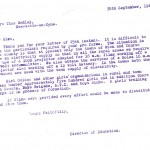 The Director of Education this week replied to a letter about the showing of films in schools and revealed the state of the county’s electricity supply: “The situation in this county is that at present only the towns of Wick and Thurso have an electricity supply so that in all the rural areas we require the use of a 200B projector adapted for 16mm films working off a 12 volt accumulator.”
The Director of Education this week replied to a letter about the showing of films in schools and revealed the state of the county’s electricity supply: “The situation in this county is that at present only the towns of Wick and Thurso have an electricity supply so that in all the rural areas we require the use of a 200B projector adapted for 16mm films working off a 12 volt accumulator.”
Wick Burgh Council debated a rather unsavoury topic this week: “Councillor Manson 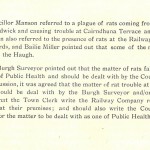 referred to a plague of rats coming from the Dam, etc., at Oldwick, and causing trouble at Cairndhuna Terrace and elsewhere. Bailie Bain also referred to the presence of rats at the Railway Station and Goods Yards.” The Council decided to complain to the Railway Company and the County Council, as it was a public health matter and affected Council properties.
referred to a plague of rats coming from the Dam, etc., at Oldwick, and causing trouble at Cairndhuna Terrace and elsewhere. Bailie Bain also referred to the presence of rats at the Railway Station and Goods Yards.” The Council decided to complain to the Railway Company and the County Council, as it was a public health matter and affected Council properties.
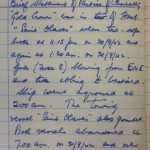 Finally this week, the John O’Groat Journal reported a daring rescue by the Wick lifeboat when a tug and barge were driven onto the rocks. The incident had in fact happened on 21 September, and was recorded in the Receiver of Wrecks log book: “Gold Crown was in tow of HMS Saint Olaves when tow-rope broke… Gale (force 8) blowing from E.N.E. and tide ebbing to westward. Ship went aground at 2.00 am. The towing vessel Saint Olaves also grounded. Both vessels abandoned at 7.00am on 21/9/42 and crew brought to Wick by lifeboat.”
Finally this week, the John O’Groat Journal reported a daring rescue by the Wick lifeboat when a tug and barge were driven onto the rocks. The incident had in fact happened on 21 September, and was recorded in the Receiver of Wrecks log book: “Gold Crown was in tow of HMS Saint Olaves when tow-rope broke… Gale (force 8) blowing from E.N.E. and tide ebbing to westward. Ship went aground at 2.00 am. The towing vessel Saint Olaves also grounded. Both vessels abandoned at 7.00am on 21/9/42 and crew brought to Wick by lifeboat.”
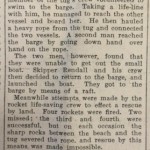
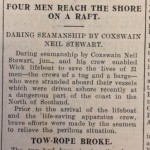 This bald account doesn’t begin to describe the drama and danger of the situation. As the paper reported, first of all some of the crew managed to get ashore to raise the alarm. Meanwhile, others tried to launch the tug’s boats, but one was “smashed by the heavy seas” and the other couldn’t be launched. Several attempts were made to fire a line from the shore by rocket, “but on each occasion the sharp rocks between the beach and the tug severed the rope”. Then the lifeboat arrived: “At great risk among the rocks and broken water, the lifeboat was skilfully manoeuvred alongside
This bald account doesn’t begin to describe the drama and danger of the situation. As the paper reported, first of all some of the crew managed to get ashore to raise the alarm. Meanwhile, others tried to launch the tug’s boats, but one was “smashed by the heavy seas” and the other couldn’t be launched. Several attempts were made to fire a line from the shore by rocket, “but on each occasion the sharp rocks between the beach and the tug severed the rope”. Then the lifeboat arrived: “At great risk among the rocks and broken water, the lifeboat was skilfully manoeuvred alongside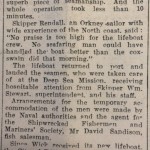 the barge, took off 28 men, and then returned to the tug to lift the remaining three. It was a superb piece of seamanship. And the whole operation took less than 10 minutes.” The paper observed that “this latest rescue is a record for the number of lives saved at one time.”
the barge, took off 28 men, and then returned to the tug to lift the remaining three. It was a superb piece of seamanship. And the whole operation took less than 10 minutes.” The paper observed that “this latest rescue is a record for the number of lives saved at one time.”
